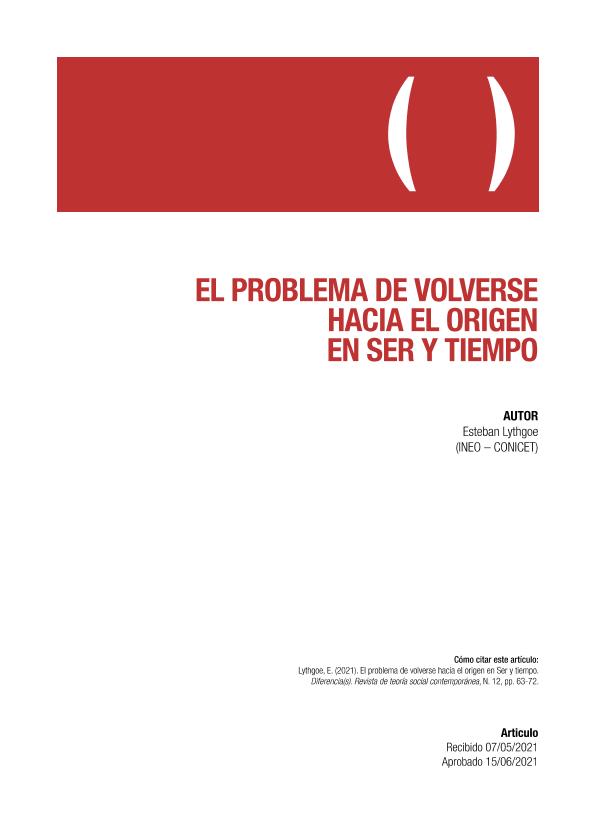Mostrar el registro sencillo del ítem
dc.contributor.author
Lythgoe, Esteban

dc.date.available
2022-10-11T11:01:08Z
dc.date.issued
2021-12
dc.identifier.citation
Lythgoe, Esteban; El problema de volverse hacia el origen en Ser y tiempo; Universidad de Buenos Aires. Facultad de Ciencias Sociales. Instituto de Investigaciones Gino Germani; Diferencias; 1; 12; 12-2021; 63-72
dc.identifier.issn
2469-1100
dc.identifier.uri
http://hdl.handle.net/11336/172363
dc.description.abstract
En el presente artículo abordaremos el modo en que Heidegger trata a la historicidad y el saber histórico en Ser y tiempo, y nos detendremos en tres cuestiones puntuales sobre el tema. En primer lugar, distinguiremos dos modos de abordar el problema del origen: uno que busca determinar la génesis a priori y otro, identificado como el momento de la destrucción, es fáctico y tiene como objeto revincularnos con el origen explicitando el modo en que la tradición oculta o afecta nuestro encuentro con él. Seguidamente, analizaremos un punto en el que consideramos convergen ambos tipos de acercamiento, a saber: la génesis de la matematización de las ciencias naturales. Observaremos los conflictos que se presentan entre ambos tratamientos, y pondremos de manifiesto el modo en que se impone el acercamiento fáctico al pasado. Compararemos, por último, la manera en que el filósofo alemán caracteriza a las ciencias naturales y a la historia; pondremos de manifiesto las diferencias existentes entre ambas, y evaluaremos los posibles motivos de dicha divergencia.
dc.description.abstract
This article will study the way in which Heidegger deals with historicality and historiology in Being and Time, addressing on three specific issues. First, we will distinguish two ways of approaching the problem of the origin: one that seeks to determine the a priori genesis and another one, identified as the moment of destruction, is factical and aims to reconnect us with origin by making explicit the way in which tradition conceals or affects our encounter with it. Next, we will analyze an issue where the two types of approach converge, namely, the genesis of the mathematical natural sciences. We will observe the conflicts that arise between both treatments, and we will reveal the way in which the factual approach to the past is imposed. Finally, we will compare the way in which the German philosopher characterizes the natural sciences and history; we will highlight the differences between both, and we will evaluate possible reasons for this divergence.
dc.format
application/pdf
dc.language.iso
spa
dc.publisher
Universidad de Buenos Aires. Facultad de Ciencias Sociales. Instituto de Investigaciones Gino Germani

dc.rights
info:eu-repo/semantics/openAccess
dc.rights.uri
https://creativecommons.org/licenses/by-nc-sa/2.5/ar/
dc.subject
Historicidad
dc.subject
Destrucción
dc.subject
Saber histórico
dc.subject
Ciencias naturales
dc.subject
Tematización
dc.subject.classification
Filosofía, Historia y Filosofía de la Ciencia y la Tecnología

dc.subject.classification
Filosofía, Ética y Religión

dc.subject.classification
HUMANIDADES

dc.title
El problema de volverse hacia el origen en Ser y tiempo
dc.type
info:eu-repo/semantics/article
dc.type
info:ar-repo/semantics/artículo
dc.type
info:eu-repo/semantics/publishedVersion
dc.date.updated
2022-09-20T18:37:05Z
dc.journal.volume
1
dc.journal.number
12
dc.journal.pagination
63-72
dc.journal.pais
Argentina

dc.journal.ciudad
Ciudad Autónoma de Buenos Aires
dc.description.fil
Fil: Lythgoe, Esteban. Centro de Investigaciones Filosóficas. Instituto de Filosofía "Ezequiel de Olaso" - Consejo Nacional de Investigaciones Científicas y Técnicas. Oficina de Coordinación Administrativa Ciudad Universitaria. Instituto de Filosofía "Ezequiel de Olaso"; Argentina
dc.journal.title
Diferencias
dc.relation.alternativeid
info:eu-repo/semantics/altIdentifier/url/http://www.revista.diferencias.com.ar/index.php/diferencias/article/view/235
Archivos asociados
